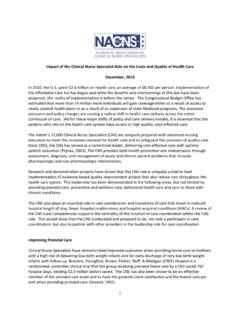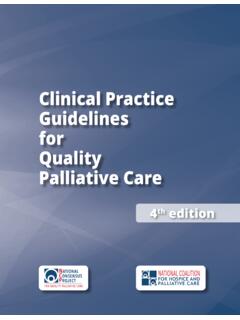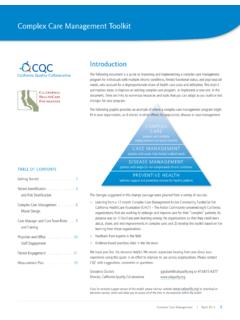Transcription of Definitions of Transitional Care Transitional care
1 Definitions of Transitional care Transitional care : care involved when a patient/client leaves one care setting ( hospital, nursing home, assisted living facility, SNF, primary care physician, home health, or specialist) and moves to another. Specifically, they can occur: 1. Within settings; , primary care to specialty care , or intensive care unit (ICU) to ward. 2. Between settings; , hospital to sub-acute care , or ambulatory clinic to senior center. 3. Across health states; , curative care to palliative care or hospice, or personal residence to assisted living. 4. Between providers; , generalist to a specialist practitioner, or acute care provider to a palliative care specialist Transitions of care are a set of actions designed to ensure coordination and continuity. They should be based on a comprehensive care plan and the availability of well-trained practitioners who have current information about the patient's treatment goals, preferences, and health or clinical status.
2 They include logistical arrangements and education of patient and family, as well as coordination among the health professionals involved in the transition . ( ). What do we mean by " care Transitions". The term " care transitions" refers to the movement patients make between health care practitioners and settings as their condition and care needs change during the course of a chronic or acute illness. For example, in the course of an acute exacerbation of an illness, a patient might receive care from a PCP or specialist in an outpatient setting, then transition to a hospital physician and nursing team during an inpatient admission before moving on to yet another care team at a skilled nursing facility. Finally, the patient might return home, where he or she would receive care from a visiting nurse. Each of these shifts from care providers and settings is defined as a care transition .
3 ( ). Transitional care Definition: 2003 position statement issued by the American Geriatrics Society: Transitional care : is a set of actions designed to ensure the coordination and continuity of health care as patients transfer between different locations or different levels of care within the same location. Representative locations include (but are not limited to) hospitals, sub-acute and post-acute nursing facilities, the patient's home, primary and specialty care offices, and long-term care facilities. Transitional care is based on a comprehensive plan of care and the availability of health care practitioners who are well-trained in chronic care and have current information about the patient's goals, preferences, and clinical status. It includes logistical arrangements, education of the patient and family, and coordination among the health professionals involved in the transition .
4 Transitional care , which encompasses both the sending and the receiving aspects of the transfer, is essential for persons with complex care needs. Coleman, 2003. Falling through the cracks: Challenges and opportunities for improving Transitional care for persons with continuous complex care needs. Journal of the American Geriatrics Society, 2003;. 51(4): 549-555. Transitional care range of time limited services and environments that complement primary care and are designed to ensure health care continuity and avoid preventable poor outcomes among at risk populations as they move from one level of care to another, among multiple providers and across settings. (Dr. Kathleen McCauley, PhD, RN, ACNS-BC, FAAN, FAHA @ NACNS , Chicago, IL). Points of transition . Transitions occur when information about or accountability/.
5 Responsibility for some aspect of a patient s care is transferred between two or more health care entities, or is maintained over time by one entity. Often information and responsibility are (or should be) transferred together. It may be useful to think about two broad categories of transitions: 1. Transitions between entities of health care system. Information transfer and/or responsibility shifts: Among members of one care team (receptionist, nurse, physician). Between patient care teams . Across settings (primary care , specialty care , inpatient, emergency department ). Between health care organizations 2. Transitions over time. Information transfer and/or responsibility shifts: follow-up visit). Across lifespan ( , pediatric developmental stages, women s changing reproductive cycle, geriatric care needs).
6 Across trajectory of illness and changing levels of coordination need (AHRQ. care Coordination Measure Atlas. December 2010). Transitional care : a set of actions designed to ensure the coordination and continuity of care received by patients as the transfer between different locations or levels of care . Parry, C., Mahoney, E., Chalmers, and Coleman, 2008. Assessing the quality of Transitional care further applications of the care transitions measure. Medical care . 2008(3):317-322. Transitional care : encompasses a broad range of services and environments designed to promote the safe and timely transfer of patients from levels of care or across settings, has emerged to bridge the gap between and among a diverse range of providers, services and settings (Coleman & Bout 2003; Naylor, 2003). (Naylor, M. Transitional care : A Critical Dimension of the Home Healthcare Quality Agenda.)
7 Journal for Healthcare Quality 2006;8(1):48-55). Transitional care : a broad range of time-limited services designed to ensure health care continuity, avoid preventable poor outcomes among at-risk populations, and promote the safe and timely transfer of patients from one level of care to another or from one type of setting to another. Transitional care is complementary to but not the same as primary care , care coordination, discharge planning, disease management or case management. The hallmarks of Transitional care are the focus on highly vulnerable, chronically ill patients throughout critical transitions in health and health care , the time-limited nature of services, and the emphasis on educating patients and family caregivers to address root causes of poor outcomes and avoid preventable rehospitalizations.
8 Naylor, , Aiken, , Kurtzman, , Olds, & Hirschman, The importance of Transitional care in achieving Health Reform. Health Affairs 2011;30(4):746-754.










